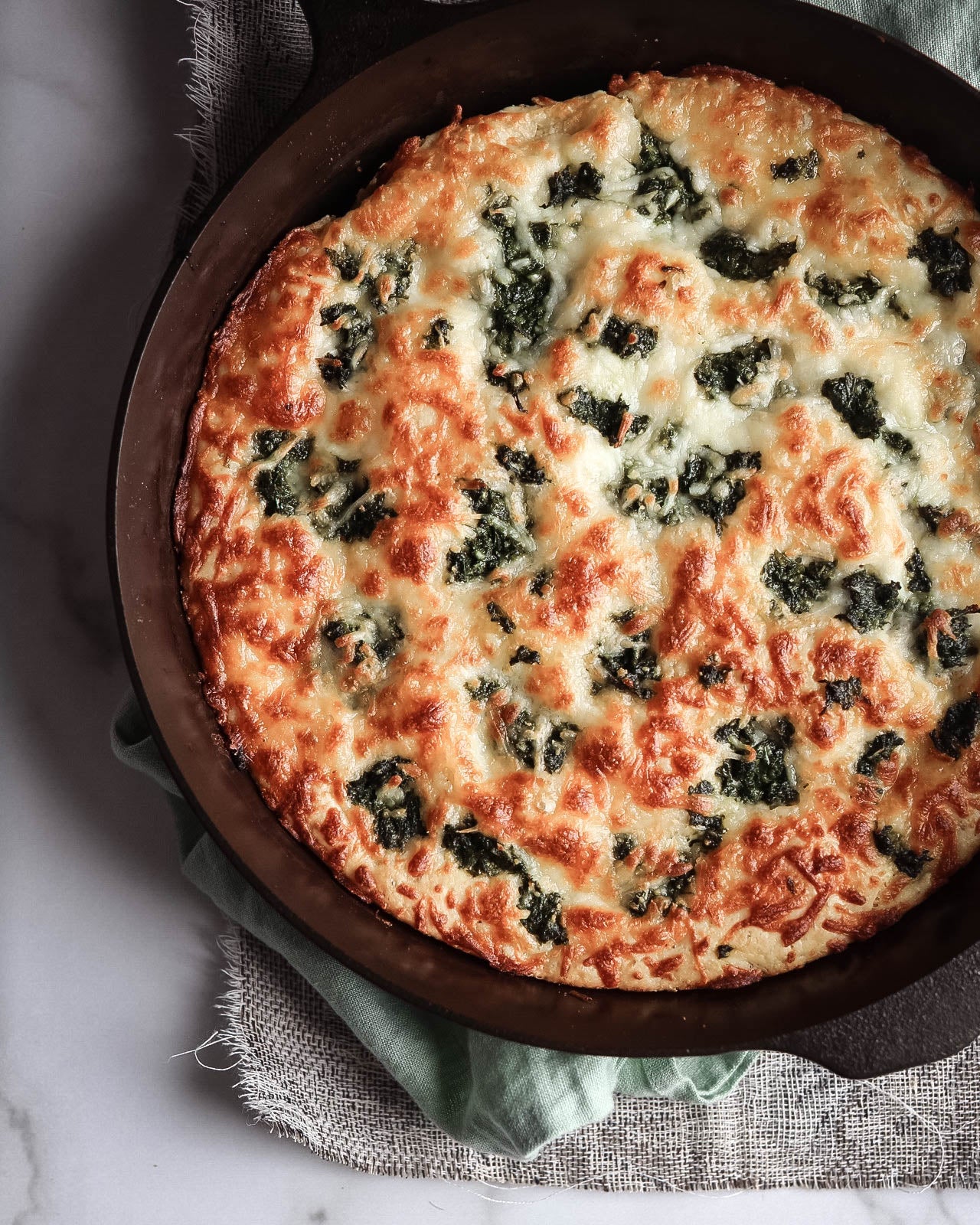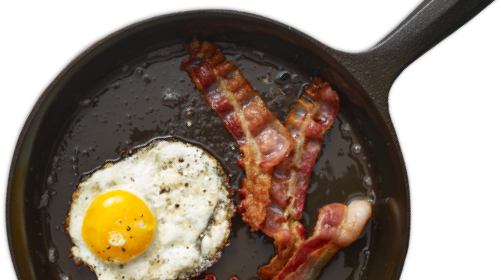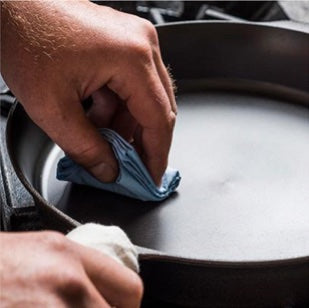

Table of Contents
- Why make pizza in a cast iron skillet?
- How do you make pizza in a cast iron skillet?
- Cast Iron Pizza Recipe
- How To Make Your Own Dough For Cast Iron Pizza
- Tips for making homemade pizza
Why make pizza in a cast iron skillet?
There are so many variations of cooking style in the world of pizza, but no cooking style gives you a crust as simultaneously light, crispy, and fluffy as cast iron pan pizza. Crispy crust is achieved through high heat, which is why wood-fired pizza ovens create such a delectable result in a short amount of time. The best pizzerias make their pies in high-heat ovens that allow dough to quickly crisp to golden brown while cheese melts and toppings meld. At home, you need a cooking surface that will get hot and retain heat to create the same perfect crust.
Cast iron cookware is one of your best options for high-heat cooking skillet pizza at home, whether in the oven, on the stovetop, or outside on the grill. Cast iron’s naturally non-stick cooking surface will help avoid sticky spots and produce an even, golden crust with crispy spots around the edges, yielding a perfect iron skillet pizza.
How do you make pizza in a cast iron skillet?
To achieve the same fast bake and perfect skillet pizza crust, you need a cooking surface that gets hot, retains heat and transfers that heat efficiently. That’s why cast iron is one of the best options for making great pizza crust at home.
Carefully spread your dough to the edge of the cooking surface to get an even crust that’s crispy on the bottom and at the edges. In a fully pre-heated oven, your skillet pizza should take about 15 minutes for a firm-not-floppy crust, and sometimes even less with thinner crust styles.
You can use a Field skillet to make cast iron pizza in just about any style, using store-bought or homemade dough and sauce, and whatever toppings you have on hand. For the best melty cheese, you’ll want low-moisture mozzarella. Feel free to add a little cheddar, caciocavallo, Brick cheese, or ricotta for white pies.

Cast Iron Pizza Recipe
Our cast iron skillet pizza recipe is highly customizable: switch up the sauce, toppings, and seasonings to your liking.
Our Detroit-style cast iron skillet pizza dough recipe makes enough dough for 2 pizzas in a Field No.8 and Field No.6 Skillet. Or a single Field No.10 Skillet with some dough left over. If you end up with extra dough, freeze or make garlic knots!
Recipe: Cast Iron Skillet Pizza
Ingredients
CAST IRON PIZZA DOUGH
2¼ cups bread flour (substitute 00 flour or all-purpose flour if unavailable)
1½ teaspoons dry active yeast
1 tablespoon kosher salt
1 cup warm water
Olive oil for bowl and pans
RED PIE TOPPINGS
Sliced pepperoni, soppressata, or coppa
Sliced white onion, lightly sweated in a Field Skillet
Low-moisture mozzarella, shredded
Red chili flakes (optional)
Extra garlic, sliced (optional)
Tools
Resources
For the sauce, your favorite store-bought marinara will be a huge timesaver. If you'd like to make your own, we recommend using Marcella Hazan's classic tomato sauce as a base. Butter and onion provide rich but not sharp texture, and optional additions like fresh oregano or chili flakes will make it your own.
The Field Method for Cast Iron Care
Instructions
Add all dry ingredients to a food processor and pulse a few times until mixed. Add warm water and process for about 1 minute. The dough should form into a ball.
Coat the bottom of a large bowl with a splash of olive oil and transfer the dough to the bowl. Cover in plastic wrap and let rise for about 2 hours, until the dough has doubled.
If using No.8 and No.6 skillet, divide the dough into roughly ⅔ and ⅓ balls. On a clean, lightly floured surface, use your hands to work each ball into round shapes roughly matching the base of your pan and desired thickness. If the dough doesn't want to stretch enough, let it rest for about 10 minutes and then stretch it again.
Preheat the oven to 500°F or as high as it will go. Coat the bottom and sides of the Field Skillets with olive oil. Heat the skillets over medium heat on the stove for about 5 minutes. Add the pre-formed dough to the skillets and use a wooden utensil to carefully spread dough to the edges of your cooking surface.

Spread the sauce in a thin layer over the surface of the dough using a spatula or the back of a spoon, leaving about ¼ inch along the sides. Add your toppings and then top the entire surface area with cheese. Be generous with your cheese along the edge of the skillet as this will help you achieve a crispy, glistening browned crust.

Bake for 15 minutes or until the cheese is bubbly and starting to brown. Remove the skillet and place on the stovetop; let cool for 5 minutes. Slide a metal spatula under the pie and transfer to a wood cutting board to cut and serve.
How To Make Your Own Dough For Cast Iron Pizza
You can follow our cast iron pizza dough recipe as listed above, but here are some pointers when making your own skillet pizza dough.
Selecting a flour for your homemade cast iron skillet pizza dough is all about the kind of crust you want to create. For Detroit-style pizza and other thicker crust varieties, the dough just needs standard bread flour. Bread flour is a better option for pizza dough than standard all-purpose flour, and will create a more chewy texture. Exactly what you want for thicker-crust styles.
Some homemade pizza dough recipes will call for ‘00’ Flour, a special finely ground Italian variety that’s particularly suited to the thin-crust texture of Neapolitan-style pizza. For a classic margherita, this is your best bet.
For store-bought pizza dough, check the ingredients list before you buy—the fewer ingredients the better—in order to understand the type of crust it will produce. Store-bought frozen dough can be highly elastic, so it helps to portion the dough into smaller balls to make it easier to spread when you’re ready to start cooking.
If anyone in your family eats gluten-free, there are now a fair number of gluten-free pizza flour options from reputable producers like King Arthur Flour and Bob's Red Mill.
Tips for making homemade pizza
Make your own cast iron pizza dough. It’s easier than you think, and making homemade dough will help you find exactly the right recipe for your preferred pizza style.
Don’t crowd toppings. A skillet pizza jam-packed with watery or oily toppings can create a soggy slice, even when your crust is fully cooked. Take it easy with the toppings, and make sure any wet ingredients are patted dry, or salted beforehand (zucchini, eggplant) to draw out moisture.
Preheat your skillet. A preheated skillet will give you a head start on crispy cast iron pizza crust and cut down on the overall cook time so your toppings stay fresh.




